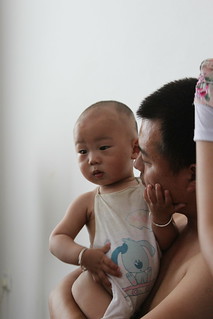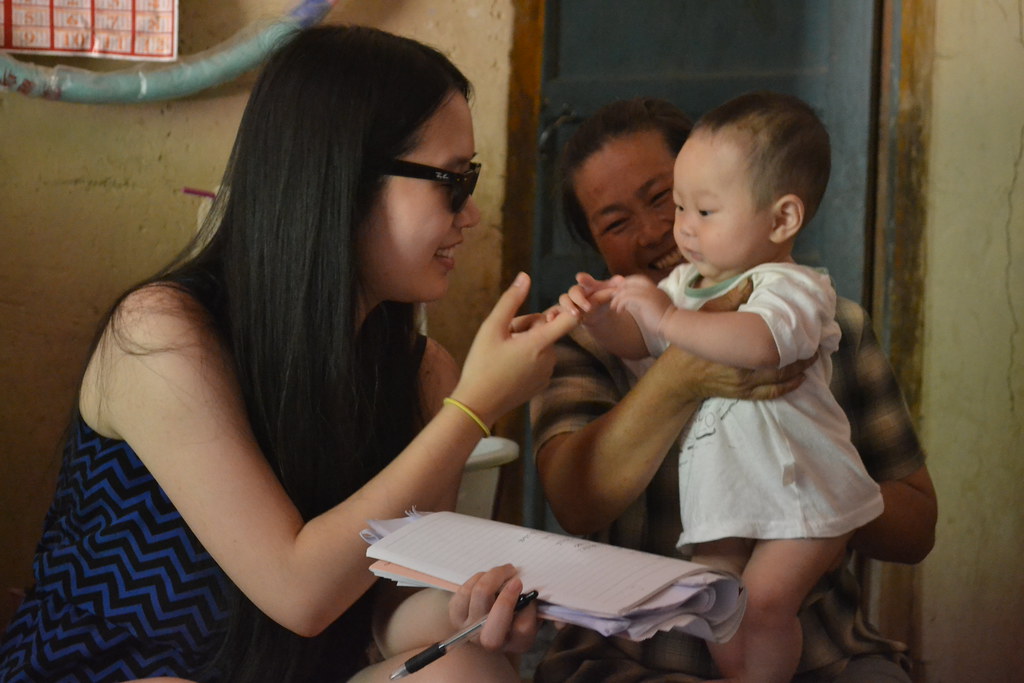Left behind by the rapid growth of the Chinese economy in large cities, Stanford researchers find that the average baby in rural China is malnourished and developmentally dealyed. As China enters a New Normal, this cycle of poverty threatens future economic growth.
Malnutrition is Pervasive Among Babies in Rural China
One of the outcomes of China's rural poverty is that up to 50% of school aged children and even higher rates of preschool children suffer from micronutrient deficiencies, including anemia. Our previous work has targeted school-aged and preschool-aged children and shown that interventions of vitamin supplements and school lunch programs reduce anemia rates and raise test scores.
However, we may have missed working with one of the most vulnerable and important population groups. Research increasingly indicates the importance of meeting the nutritional needs of children in their first 1,000 days of life, from conception to 2 years of age. The effects of inadequate nutrition in this brief window are long-term and irreversible, resulting in lower educational attainment and lower lifetime earnings.
 |
|
Effects of inadequate nutrition at an early age are long-term and irreversible. |
Despite the importance of early childhood nutrition, there is little information about the scope of the problem in China, where baby growth and development are largely overlooked by policymakers. This gap not only motivates REAP to shed light on the issue, but provides an opportunity to shape evidence-based policy solutions that could give babies in China’s rural communities a healthier start in life.
Simple Policy Changes Can Make a Difference
The overall goal of our proposed work is to identify simple and sustainable ways of improving infant nutrition in rural China. Our project will create an infrastructure through which caregivers and local health care clinics can provide ongoing education and nutritional supplements to reduce and prevent anemia in their communities. Finally, we will present the project’s feasibility and results to key policymakers capable of funding and promoting the most effective solutions.
In-Depth Research Reveals the Problem
In the spring of 2013, REAP launched the “Nourishing the Future” program, a new project is designed to illuminate the scope of the malnutrition problem among babies in rural China, and identify cost-effective, scalable ways to reverse the harmful effects of malnutrition among this vulnerable population. In Phase 1 of the project, we aim to:
- Determine how much rural caregivers know about malnutrition and healthy baby feeding
- Measure the prevalence of malnutrition among rural babies aged 6-12 months
- Measure babies’ overall development relative to well-nourished babies around the world
In April, 2013, a team of 100 REAP nurses and enumerators took to the field to administer Phase 1 baseline tests to nearly 1,000 babies in over 350 villages in rural Shaanxi Province. Every day during the survey, each enumerator visited two households to conduct in-depth family interviews, collecting detailed information on baby’s feeding habits, caregiver knowledge of baby nutrition, and basic demographic information. They also administered to each baby an internationally-scaled developmental test (the Bayley Scales of Infant Development) to test his or her cognitive and motor development.
A team of nurses also visited each household and measured babies’ height, weight, and hemoglobin levels (an indicator for iron deficiency and anemia). The mothers’ hemoglobin levels were tested as well.
 |
Phase 1: By the Numbers
- 1,000 babies
- 350 rural villages
- 70 volunteers
- 17,690 volunteer-hours
80% of Rural Babies are Anemic or Iron Deficient
When the results of our April survey came back, the rates of malnutrition were higher than even our seasoned project team could have imagined: over half (55%) of the babies in our sample were anemic. Even more frightening, nearly 80% of babies were iron deficient (anemic or borderline anemic). In the simplest terms, this means that China is raising an entire cohort of babies who are sick because they are not getting enough nutritious food. Most of the babies that we surveyed looked healthy, but that is one of the dangers of malnutrition: it is largely invisible. There are often no symptoms that anything is wrong at all.
The Average Rural Baby is Developmentally Delayed
Stanford REAP’s work is able to look at more than just the nutritional status of babies. In fact, one of the main motives of our project is to measure the impact of good nutrition on cognitive development and motor skills (baby’s strength and coordination, which are highly correlated with long-run cognitive and physical development). Because of this goal, we made a large effort at the beginning of the project to measure the starting (baseline) levels of babies’ cognitive and motor development. These baseline measures give us a snapshot of the larger problem that we are facing, and will allow us to follow the progress of baby’s development over the course of our project.
So what did we find? What is the nature of the development of babies in rural China? Again, our research team was astounded by the severity of the problem we had uncovered. Over all, more than 70% of the babies we tested were developmentally delayed relative to the healthy international standard. Around 35% of babies were significantly delayed in their cognitive development. More than 55% were significantly delayed in their motor development. Poor nutrition = delayed development!
In the long run, these results could have serious implications for China’s economy. Our findings show that the average rural Chinese baby is developmentally delayed. If these babies’ nutrition and environment do not improve, they will likely be facing a lifetime of permanent underperformance: they will drop out of school earlier, get worse jobs, and have lower lifetime incomes. At a time when China’s growth is already beginning to slow, this artificially imposed subtraction from the skilled labor force could be devastating.
The scope and implications of China’s malnutrition problem are staggering. However, the real story is that many of these developmental handicaps can be easily prevented with just a few dietary changes. The high rates of malnutrition in these rural areas are almost certainly playing a large role in delaying children’s development. In fact, our data show that anemic babies are more likely to be experiencing these developmental delays than healthy babies.
We are now in Phase 2 of our project, which will enable us to measure the impact of providing a daily nutritional supplement packet on babies’ health and development. We plan to follow our sample babies for a total of 18 months, to gain a better understanding of the short-run impacts of regular supplementation. We hope that our work will eventually be used to inform national policy decisions in China. Together, we try to build a rural population that is healthy, strong and smart, to literally and figuratively nourish the future of China. Stay tuned!
